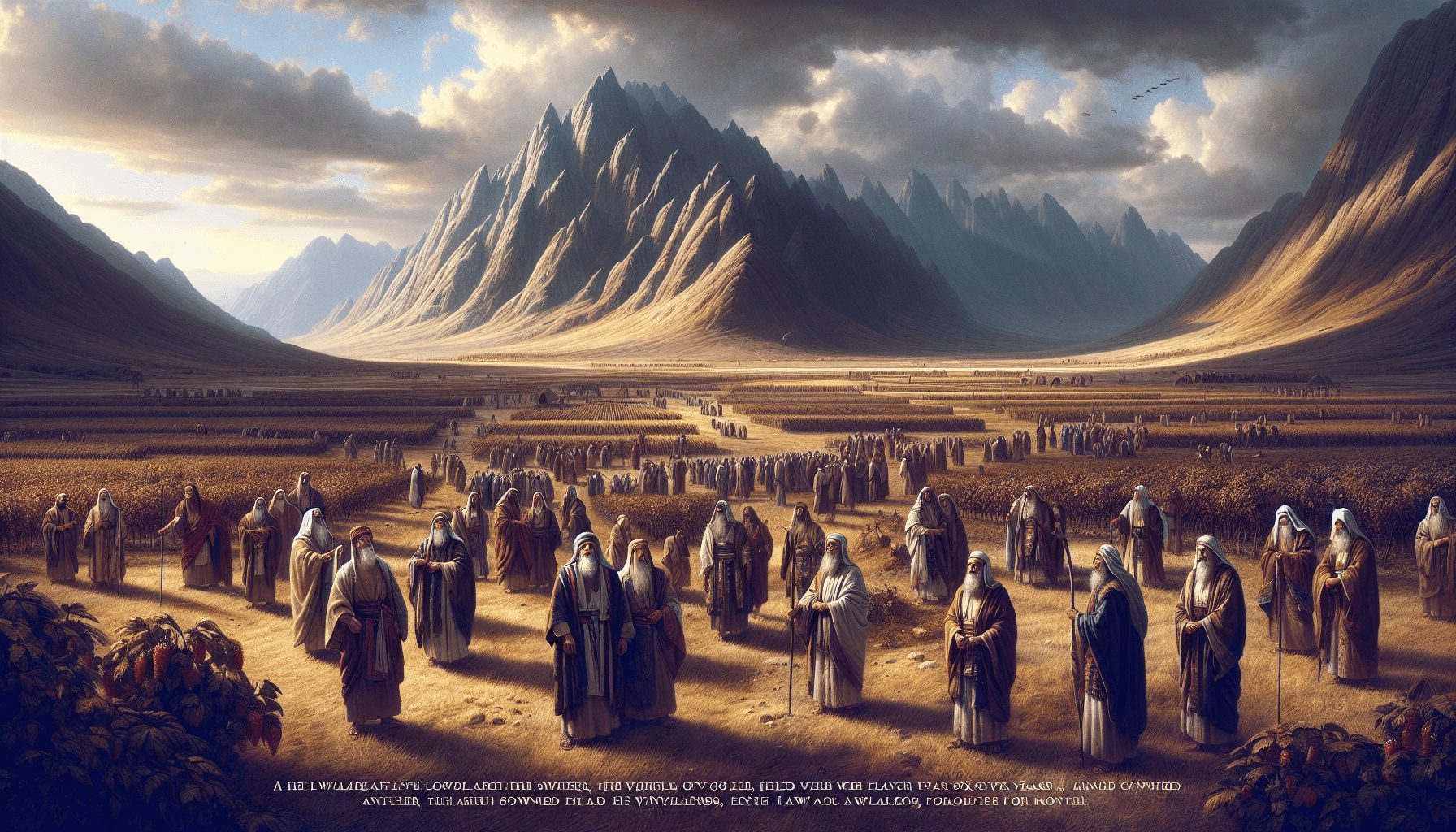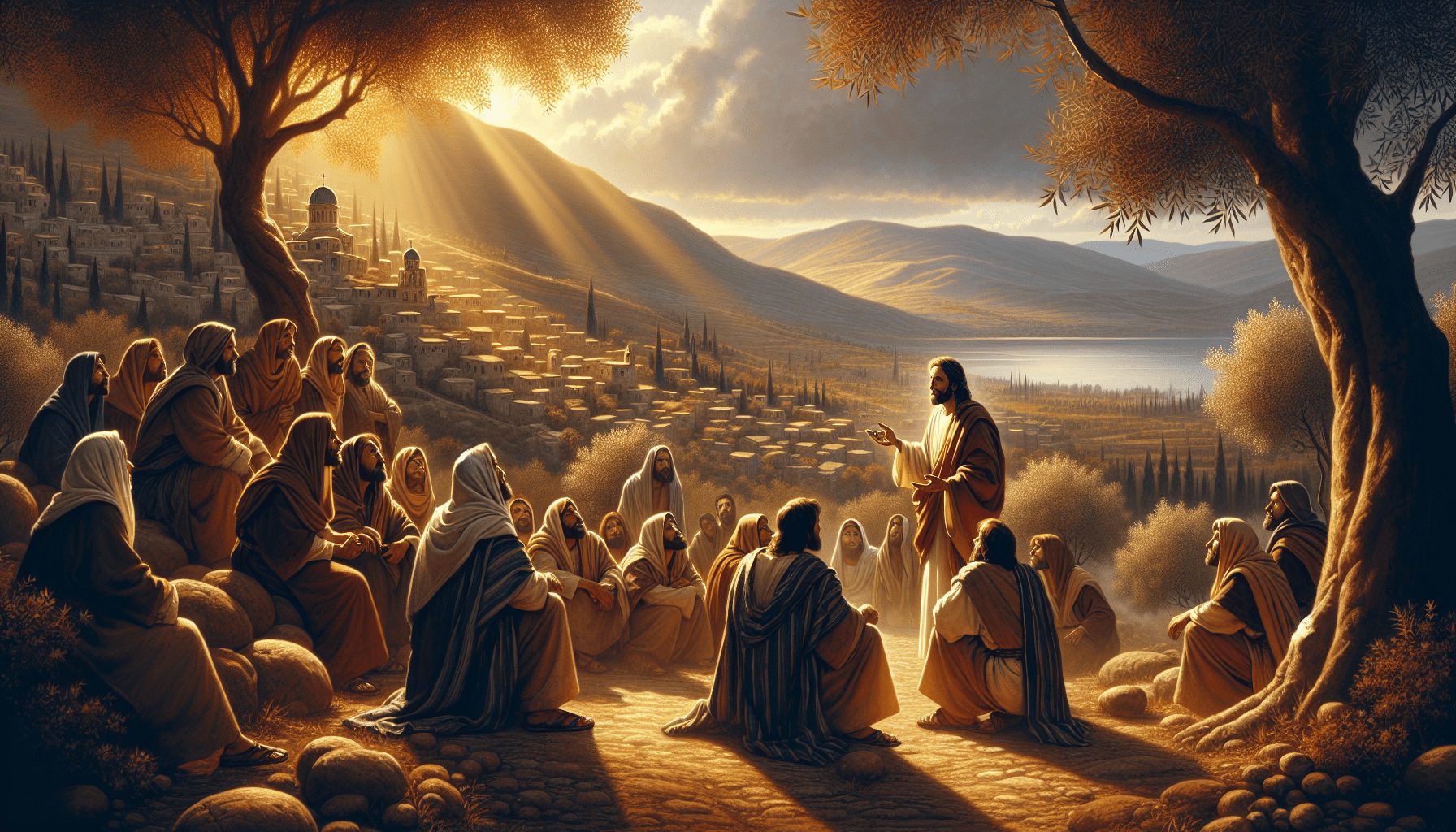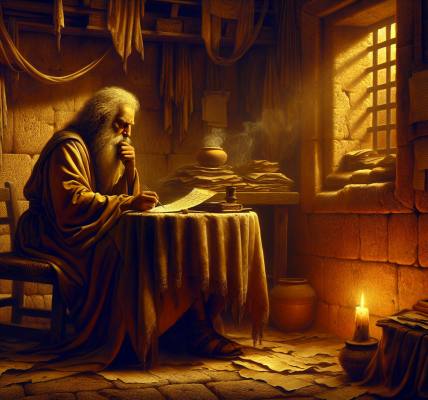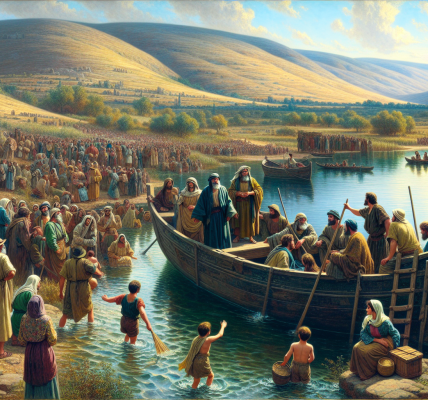**The Year of Jubilee: A Story of Restoration and Redemption**
In the land of Canaan, where the Israelites had settled after their exodus from Egypt, the Lord spoke to Moses on Mount Sinai, giving him laws and commandments to guide His people. Among these laws was a profound and revolutionary instruction: the Year of Jubilee. This was to be a time of restoration, freedom, and divine provision, a year unlike any other, when the land and its people would experience the mercy and justice of God.
The Lord declared to Moses, “When you enter the land I am giving you, the land itself must observe a Sabbath to the Lord. For six years you shall sow your fields, prune your vineyards, and gather their produce. But in the seventh year, the land shall have a Sabbath of solemn rest, a Sabbath to the Lord. You shall not sow your field or prune your vineyard. What grows of its own accord you shall not reap, nor gather the grapes of your untended vines. It shall be a year of solemn rest for the land.”
The people listened intently as Moses explained the significance of the Sabbath year. It was a reminder that the land belonged to the Lord, and they were merely stewards of His creation. By allowing the land to rest, they acknowledged God’s sovereignty and trusted in His provision. But the Lord did not stop there. He revealed an even greater mystery: the Year of Jubilee.
“Count off seven Sabbath years—seven times seven years—so that the seven Sabbath years amount to a period of forty-nine years,” the Lord instructed. “Then, on the tenth day of the seventh month, on the Day of Atonement, you shall sound the trumpet throughout your land. Consecrate the fiftieth year and proclaim liberty throughout the land to all its inhabitants. It shall be a Jubilee for you; each of you shall return to your own property, and each of you shall return to your family.”
The Year of Jubilee was a time of radical restoration. Any Israelite who had sold their ancestral land due to poverty or hardship would have it returned to them. Those who had become indentured servants to pay off debts would be released and reunited with their families. The land itself would rest, as in the Sabbath year, and the people would live off what it produced naturally. It was a year of freedom, a year of reset, a year when the inequalities and injustices of life were overturned by the grace of God.
Moses explained further, “The land must not be sold permanently, because the land is Mine and you reside in My land as foreigners and strangers. Throughout the land that you hold as a possession, you must provide for the redemption of the land.” This meant that if an Israelite fell into poverty and had to sell their land, a close relative could redeem it by paying the price owed. If no one could redeem it, the land would still return to its original owner in the Year of Jubilee. The Lord’s justice ensured that no family would permanently lose their inheritance.
The people marveled at the wisdom and compassion of God’s law. It was a system designed to prevent the permanent accumulation of wealth and power in the hands of a few, ensuring that every generation had a fresh start. The Year of Jubilee was a tangible expression of God’s heart for the poor, the oppressed, and the marginalized. It was a reminder that He was their ultimate Redeemer.
As the years passed, the Israelites began to observe the Sabbath years and the Year of Jubilee. In the forty-ninth year, the anticipation grew. On the Day of Atonement, the high priest would sound the shofar, a ram’s horn trumpet, and its blast would echo across the hills and valleys of Canaan. The sound was a proclamation of liberty, a call to freedom that stirred the hearts of all who heard it.
One such Jubilee year arrived, and the people prepared for its arrival with reverence and joy. In a small village nestled in the hills, a man named Eliezer waited anxiously. Years earlier, a series of poor harvests and mounting debts had forced him to sell his family’s ancestral land to a wealthy neighbor. Since then, he had worked as a laborer, barely scraping by. But now, the Year of Jubilee had come, and with it, the promise of restoration.
On the Day of Atonement, Eliezer stood outside his humble dwelling, listening for the sound of the shofar. As the sun dipped below the horizon, the high priest in Jerusalem lifted the horn to his lips and blew a long, clear note. The sound carried on the wind, reaching every corner of the land. When Eliezer heard it, tears streamed down his face. “It is the Jubilee,” he whispered. “The Lord has set me free.”
The next morning, Eliezer gathered his few belongings and set out for the land that had once belonged to his father. When he arrived, he found his wealthy neighbor waiting for him. To his surprise, the man greeted him with a smile. “The Lord has commanded us to observe the Jubilee,” he said. “This land is yours once more. May it prosper in your hands.”
Eliezer fell to his knees and praised the Lord. He plowed the fields and planted seeds, trusting that God would provide a bountiful harvest. As the months passed, he worked diligently, and the land yielded its fruit. His family, once scattered and struggling, was reunited, and they celebrated with feasts and songs of thanksgiving.
In another part of the land, a woman named Miriam experienced the joy of the Jubilee in a different way. Years earlier, her husband had died, leaving her with no means to support herself. She had been forced to sell herself as a servant to a kind-hearted family in a nearby town. Though they treated her well, she longed to return to her own family. When the shofar sounded, her master called her into his home. “Miriam,” he said, “the Year of Jubilee has come. You are free to return to your family. Go in peace, and may the Lord bless you.”
Overwhelmed with gratitude, Miriam embraced her master and his family. She packed her belongings and set out for her childhood home, where her brothers and sisters welcomed her with open arms. Together, they celebrated the goodness of God, who had brought restoration and redemption to their lives.
Throughout the land, similar scenes unfolded. Families were reunited, debts were forgiven, and the land rested under the watchful care of its Creator. The Year of Jubilee was a foretaste of God’s ultimate plan for His people—a time when all things would be made new, when every tear would be wiped away, and when justice and mercy would reign forever.
And so, the Israelites learned to trust in the Lord’s provision and to live in obedience to His commands. The Year of Jubilee became a symbol of hope, a reminder that no matter how far they strayed or how deep their struggles, the Lord was always ready to restore and redeem. For He is a God of justice, a God of mercy, and a God who keeps His promises.




